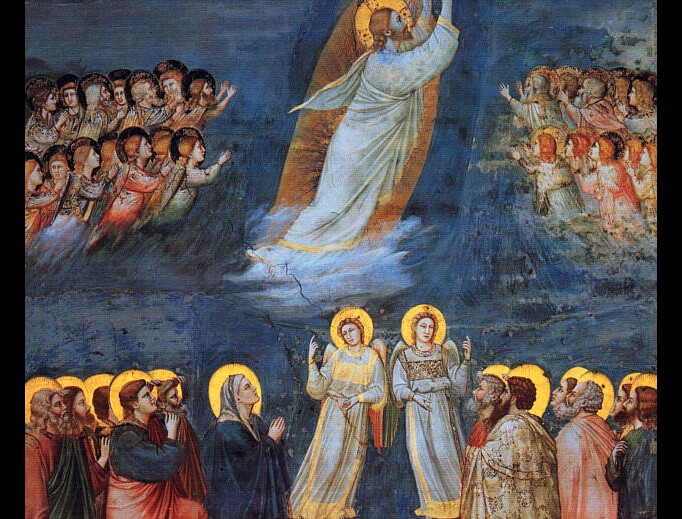Were the Apostles Sad at the Ascension?
“Let us rejoice with spiritual joy, and let us with gladness pay God worthy thanks and raise our hearts' eyes unimpeded to those heights where Christ is.” —Pope Leo I

When we imagine the Apostles watching Jesus ascend through the clouds into the heavens, the event of Our Lord’s Ascension might strike us as a rather sad event.
After all, the Apostles had spent three years with Jesus, during which time they developed a love for Him that can scarcely be fathomed. For those years, they were blessed beyond measure: they had a personal friendship with God. In losing Jesus on Good Friday, they experienced the most terrible loss of their lives. To make matters worse, all the remaining Apostles, other than John, were forced to ponder the fact that they had not even been present for His Passion and Crucifixion. Each of them must have craved to fall at the feet of Jesus and beg the forgiveness of their Friend. They must have so desperately wanted to see Him again.
And they did. Jesus rose from the dead and later appeared to them, and we can believe that their love and affection for Jesus was stronger than ever before in these days after the Resurrection. But, as we know, their time with Him was short; just a few weeks later, Jesus departs from them, ascending into Heaven.
Thus, from the Apostles perspective, the Ascension might appear as an occasion of great sadness.
Yet, Pope Leo the Great delivered two sermons on Our Lord’s Ascension that address this question, in which Leo argued that the Ascension was not a moment of sadness, but joy:
And hence the most blessed Apostles and all the disciples, who had been both bewildered at His death on the cross and backward in believing His Resurrection, were so strengthened by the clearness of the truth that when the Lord entered the heights of heaven, not only were they affected with no sadness, but were even filled with great joy. And truly great and unspeakable was their cause for joy, when in the sight of the holy multitude, above the dignity of all heavenly creatures, the Nature of mankind went up, to pass above the angels' ranks and to rise beyond the archangels' heights, and to have Its uplifting limited by no elevation until, received to sit with the Eternal Father, It should be associated on the throne with His glory, to Whose Nature It was united in the Son.
As Pope Leo describes, not only was the faith of the Apostles profoundly confirmed by the Ascension, but the Apostles finally understood Jesus’ words: “If I shall go, and prepare a place for you, I will come again, and will take you to Myself; that where I am, you also may be.” (John 14:3) The Apostles also knew that Jesus was sending the Holy Spirit, Who would comfort them. In His Ascension, Jesus was not abandoning them; He was going to prepare a place for them in Heaven, where there is no sadness but only happiness.
Therefore, Pope Leo argues, the Apostles were reinvigorated with joy.
The Ascension should fill us with joy and give us hope today as well. Saint Thomas Aquinas explains that one of the effects of the Ascension is to give us hope: “For by placing in heaven the human nature which He assumed, Christ gave us the hope of going thither.” The Ascension should serve as a reminder to us that we also are meant for Heaven. We were created by God to share His eternal happiness. Moreover, we must rejoice in the fact that Jesus is still with us in the Blessed Sacrament, as Leo reminds us: “And so that which till then was visible of our Redeemer was changed into a sacramental presence.”
When the troubles of the world weigh us down, when we are tempted to sadness, we need to remember that Jesus was ascending in order to prepare a place not only for the Apostles, but for all those who love Him. When it seems that evil has been victorious, that the devil has somehow won, we must remember the Ascension as proof that Christ has won. Indeed, He has conquered the world. And conquered evil. Ascension Thursday should be a time of great joy for all the members of the Mystical Body of Christ. As Pope Leo advises, “And so, dearly-beloved, let us rejoice with spiritual joy, and let us with gladness pay God worthy thanks and raise our hearts' eyes unimpeded to those heights where Christ is.”
This article originally appeared May 24, 2017, at the Register.
#ascension













